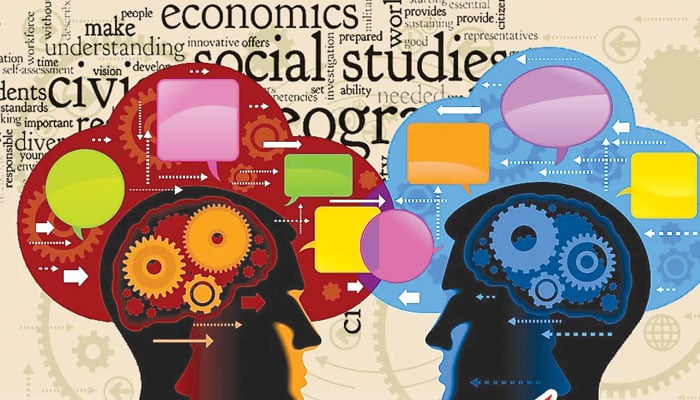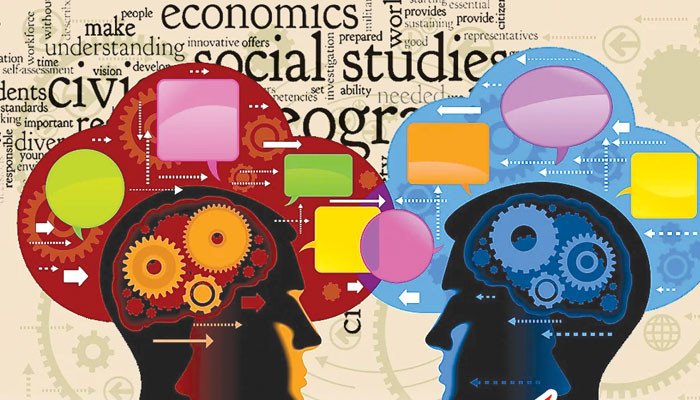
In various countries of the world, the importance of social studies has been decreasing in the prevailing educational systems. In the third decade of the 21st century, it is felt that the social sciences are being revived in a sense in the major universities of the world. And the ‘state of the art’ of the present time or the most modern and useful subjects are also the aspects of the social sciences. Considering the inevitable, the most appropriate place is being given, so the universities that provide the best expertise in the fields of information technology, business administration, applied sciences, are also including economics, history, sociology and philosophy. The reasons for this trend can be traced partly to evolving thinking about the aims of education and partly to the contemporary global economic system.
As far as historical facts are concerned, amid the rapid scientific development and industrial and business activities of Europe and America in the nineteenth century, the thought was nurtured that now that so many fields of science had opened up, it was necessary to specialize in each knowledge. should be accepted as a means of success. This skill also had some advantages in that its aspirant could truly achieve a degree of excellence in a particular task by devoting full-time attention to his own field. But in this struggle it was very likely that he would become indifferent to other areas of life, which were more important in their place, and fall short of his overall personality and social responsibilities.
At the beginning of the 20th century, the above-mentioned feeling began to take place prominently in the writings of intellectuals. Thinkers like Whitehead and Bertrandsell established the opinion that we should once again go to the correlation of sciences. The concept of a successful person is Found that he has his own special knowledge, even if he is a scientist and even if he is an expert in public policy, he also has social consciousness, aesthetic sense, and on the moral level, he also has respect for humanity.
In other words, a successful, satisfied and beneficial person for the society is one who has mental and practical connection with different areas of life, and who is a cultured person in the true sense. Good educational systems are those which welcome this new feeling and try to adapt themselves to its demands.
One of the reasons for the interrelationship of different sciences is the increasing globalization, the spread of the market economy and the resulting competitive atmosphere in which everyone is engaged in the exercise of convincing himself that he is a better candidate than the other. Today, if the leading foreign and domestic institutions of business administration and information technology are including social sciences in their curriculum, one of the reasons is to provide their graduates with added value in the job market.
Today, in the universities of many countries in Europe, America and the Far East, special importance is being given to those who know more than one language and their education. This thing is not only limited to languages, but in big universities, a student who gets a degree in one field has to choose subjects from other fields as well. This trend is being promoted not only in general universities but also in specialized universities for medicine, engineering, business administration and information technology.
In the contemporary world, under the influence of globalization and globalization, as the market economy is rapidly establishing its viability in different regions of the world, the purpose of education has also been found to support the globalization of this economy. Therefore, a term ‘Knowledge-bearing economy’ has been coined, which means that if there is knowledge for the economy and the economy should make full use of knowledge for its growth. The negative aspects of allocating knowledge and education to the economy were in their place, but it was to point to a new and contemporary trend driven by correlation.
Understanding the importance of social sciences and promoting these sciences, it is also of fundamental importance that what is the attitude of the state and society of a country towards them? Social sciences are mostly developed through educational and research institutions. Therefore, these institutions, especially universities, have a major key role in the development of social sciences. Every year the Nobel Prizes in different fields of science are more or less awarded to the teachers associated with the universities. The major universities of the world are known for their scientists, economists, sociological thinkers etc.
If we turn the conversation towards Pakistan, the first impression that can be presented without fear of denial is that the situation of education and knowledge is very poor here. The social sciences appear to be even more backward, the reasons for which need to be considered. As far as our institutions are concerned, this sad situation has come to light after consideration that with the passage of time, our universities have come to the status of colleges, if our colleges are no longer mere buildings and something is taught there. Even so, their status is no more than the extension of schools.
In such a situation, one can imagine what image of backwardness our schools will present. In universities, especially in the fields of social sciences, students are generally exposed to a few specific textbooks and most teachers repeat their notes taught over the years in the classroom.
The creation of new knowledge in universities is a distant thing, there is an atmosphere of complete ignorance from the new books published in the world and the ongoing scientific discussions in research journals. A few teachers will certainly be familiar with new books and journals in a few fields, but the general environment of universities has become an environment of indifference and ignorance towards new knowledge and research.
In the past seventy-five years, intellectuals have pondered over the issue of what is the state of social sciences in Pakistan, and why have they been so neglected here? Several years ago, SH Hashmi’s book ‘The State of Social Sciences in Pakistan’ was published. After that, another book ‘Pakistan Mein Social Sciences: An Outline’ was published in which the authors Dr. Inayatullah, Dr. Rubina Sehgal and Dr. Parvez Tahir were.

Another book authored by Dr. Akbar Zaidi was ‘Disappointing State of Social Sciences in Pakistan’. From all these researches, it has become very clear that social sciences have not made any significant progress in Pakistan. Except for one or two, our universities did not publish the books that would have been discussed in other universities of the world, nor did such experts in social sciences come forward whose ideas would have created some academic upheaval.
Why is this the case? Why are social sciences not prominent here and why are our universities largely barren in this regard? If we consider the reasons, the first thing that comes out is that for science, business administration and IT, it may not be so indispensable, but for social sciences it is absolutely indispensable that there should be a democratic atmosphere and a democratic culture in the country in which Different viewpoints should not only be tolerated but also encouraged.
Closed societies follow fixed paths, imitation is fostered in them, criticism and ways of searching for new ways are blocked. These closed societies are also afraid of new ideas and fresh thoughts, and the state, governments. They also do not waste a moment in erecting obstacles in front of them.
It is manifested by the fresh thoughts of the fresh world
That is not made of stone and clay
Unfortunately, we in Pakistan have been engaged in the futile practice of creating a place out of stone and clay for the past seventy-five years. Our tragedy is that since independence we have not experienced the true free atmosphere which is the religion of democracy and in which societies find new ways through reason and enlightenment. Nurturing and imparting knowledge is also possible in such a democratic atmosphere.
Since we don’t have that atmosphere here, our social science fields are reduced to repeating traditional and time-honored narratives. Is it not worth noting that the Pakistani sociologists who went out of Pakistan and studied in foreign universities, did their PhD there and then published their research from there did significant work. The weight was felt in the academic world.
How many Pakistani senior scholars can be mentioned whose writings have been the subject of discussion in foreign universities for years. Professor Khalid bin Saeed, Dr. Hafeez Malik, Dr. Anwar Syed, Professor Hamza Alvi, Dr. Feroze Ahmed, Professor Hasan Gardizi, Dr. Ayesha Jalal, Dr. Iftikhar Malik, these and twenty other social scientists whose work is worthless even today. is felt in the world.

The Higher Education Commission has a strict control over the education of universities in Pakistan. In the eighteenth constitutional amendment, most of the work of education was transferred to the provinces, but with the approval of the amendment, a ministry of education in the center, which has changed many names. was established. In these two centers, if some strategy is made regarding education, science and other more modern, as well as economy-oriented fields are given priority. are
Then, sometimes there is a state of awareness regarding social sciences, but in one and a half years, it also fades. Many years ago, there was a ferment, Dr. Manzoor Ahmed, then Dr. Ishrat Hussain, after that, Dr. Nizamuddin. In the leadership, social science committees were formed, long consultations were held, reports were made, decisions were made, but then a silent silence spread. Meetings are held, decisions are made, then no meetings are held for months to review the implementation of those decisions, and when they are, many of the participants from the previous meetings have retired, many of the new arrivals They sit down to revise.
One of the consequences of the undemocratic attacks on the social sciences is that university teachers have imposed self-imposed restrictions on themselves. Don’t create things to blame for. This did not allow the culture of research to flourish in the universities. Therefore, teachers generally find themselves forced to present the known things in the name of research. HEC has fixed the number of research papers for teacher development, so now the race is on to see how soon a fixed number can be achieved.
Serious steps are needed to understand the importance of social studies in Pakistan and then integrate them optimally into the education system. It is necessary to end the government control over the education sector. The autonomy of the universities should be ensured, the ways of connection between different sciences should be found and research should be developed in the true sense instead of just being done in the name of research in the universities.
